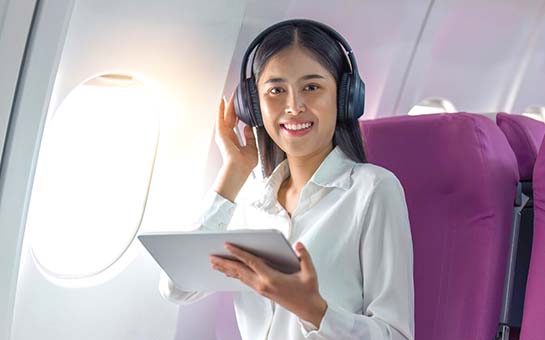A modern airliner is a wonder of safety that has been tested, re-tested, and painstakingly engineered to fly passengers every single day for 20 years or more. Every system has several backup systems, and there are protocols to handle almost any event that may occur. It’s no wonder that traveling by airliner is the safest way you can travel.
But still, incidents can occur. And although it is exceedingly rare that they are catastrophic, there is always a remote possibility that you may need to quickly evacuate the aircraft in an emergency. If this were to happen to you, some of the decisions you make long before your flight takes off could have a big impact on the inconvenience this could cause, or even the injuries you might receive. To be as prepared as possible, follow these flight attendant-approved flight safety tips whenever you take to the sky.
1. Wear Sensible Clothes
Ideally, you should wear clothes that would be comfortable to walk around in all day in cool weather. This means no flip-flops, no skirts, no heels, and no stockings. None of these would be good choices if you suddenly had to move quickly and step over debris to get out of the plane. Also, avoid wearing shorts. If you have to use the escape slide, you could get friction burns if you wear them. Instead, choose jeans or slacks, tennis shoes or loafers, and a loose-fitting shirt that’s comfortable and easy to move in.
2. Carry Essentials on Your Body
In the event of an emergency evacuation of the plane, it’s unlikely that you’ll be able to grab your carryon bag, and it could be deadly to delay your exit. And if your carryon is what contains your travel documents, passport, etc., you could be in for a huge hassle. Instead, carry a travel wallet or very small bag such as a fanny pack or cross-body bag, and keep it on you at all times. This should contain your passport, cash, credit cards, essential medications, and other things you can’t do without. If there is an emergency, you now won’t have to waste a second thinking about your valuables.
3. Try to Pay Attention to the Safety Briefing
Yes, we all zone out as soon as the plane starts taxiing, but it’s a good idea to actually pay attention to the flight attendant when they point out where the emergency exits are. This might be a different model of plane than you’ve flown on previously, so don’t assume everything will be in the same place.
4. Go Easy on Alcohol
Those who are on vacation may want to start the party as soon as drink service begins, but you need to keep your wits about you. The last thing you want if you suddenly need to make decisions to save your life or a family member’s life is to be intoxicated. Have no more than one drink per hour when flying. You can wait until you arrive at your destination before letting your hair down.
5. Buy Travel Insurance
If the worst should happen, you need to have the right insurance coverage in place to protect your health and your bank account.
If you’re traveling abroad to a location outside the United States, look into travel medical insurance. If you get injured outside your home country during your trip, a travel medical insurance plan can help make sure you can get essential medical treatment without draining your savings. Remember, your domestic health insurance is unlikely to be accepted outside your home country, so you need to have valid coverage.
Those traveling internationally to the United States can purchase visitors medical insurance. Trust us when we say that no one wants to be exposed to the high cost of American healthcare without insurance coverage, and the insurance from your home country won’t do you any good in the USA. Visitors medical insurance can shield you from unaffordable hospital bills if you get injured or become sick during your trip to the USA.
If you’re flying domestically within the USA or internationally, strongly consider travel insurance coverage. In addition to trip cancellation coverage, a travel insurance plan can provide financial protection in case of lost or delayed luggage, or a or delayed flight. This can be a huge help if you encounter some unexpected turbulence in your travel plans.
